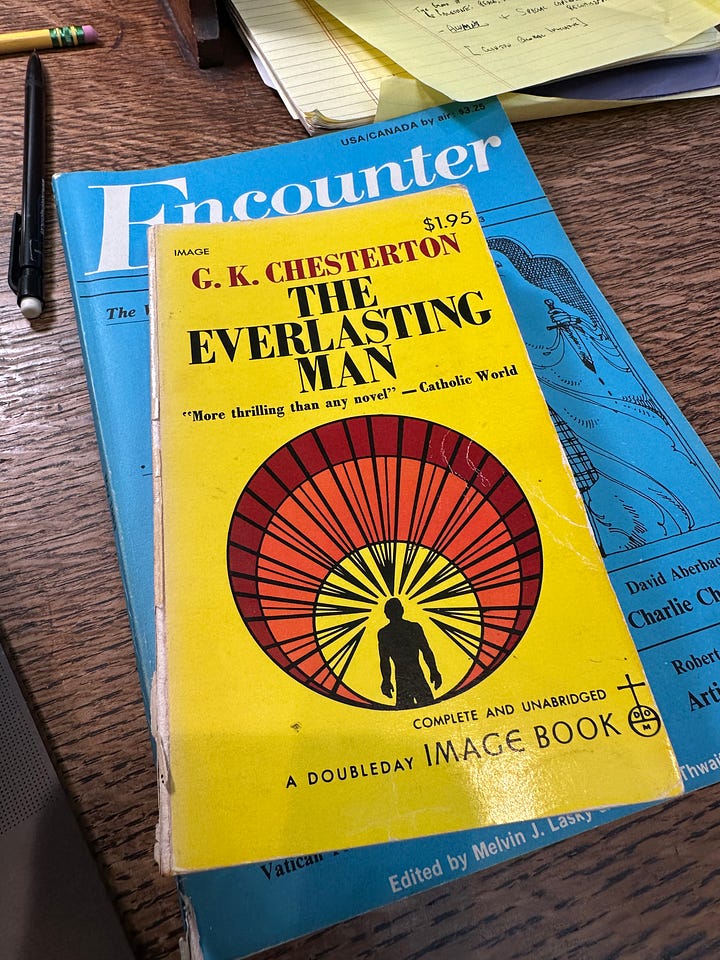"The Strangest Story in the World"
Why G.K. Chesterton seldom wrote directly about the Easter Resurrection or salvation
I thought for an Easter greeting it might be interesting to delve into my ample G.K. Chesterton shelf for something suitable and edifying. It turns out to be surprisingly difficult to find him writing directly about Easter, though perhaps a reader more versed in the GKC canon will point me in the right direction.
But this seems not that surprising if you think about it for a moment. Few Christian writers have ever been more alert to paradox than Chesterton; the recognition of paradox does not try to rationalize the essentially mysterious quality of faith or salvation. You can make out a logic to the Christian story in Chesterton’s labyrinthine prose, but it is not the formal logic of the mathematician or analytic philosopher (or theologian).
And thus one of the few passages of Chesterton that incorporates the Good Friday to Easter Sunday cycle is found in the chapter in The Everlasting Man entitled “The Strangest Story in the World,” but it is not the standard Easter narrative and barely references the Resurrection. Two key excerpts:
Jesus of Nazareth was less prudent in his miracles [than Greek gods like Apollonius]. When Jesus was brought before the judgment-seat of Pontius Pilate, he did not vanish. It was the crisis and the goal; it was the hour and the power of darkness. It was the supremely supernatural act of all his miraculous life, that he did not vanish.
Every attempt to amplify the story has diminished it. The task has been attempted by many men of real genius and eloquence as well as by too many vulgar sentimentalists and self-conscious rhetoricians. The tale has been retold with patronizing pathos by elegant skeptics and with fluent enthusiasm by boisterous best-sellers. It will not be retold here. The grinding power of the plain words of the Gospel story is like the power of mill-stones; and those who can read them simply enough will feel as if rocks had been rolled upon them. [Emphasis added.]
But then Chesterton does go on to retell the story after a fashion at the end of the chapter, but as I say it reads differently than the usual accounts given on this highest of holy days, as readers come to expect from him. Here we see not just the rebirth of the Savior or the mere promise of individual salvation, but rebirth of human history itself:
They took the body down from the cross and one of the few rich men among the first Christians obtained permission to bury it in a rock tomb in his garden; the Romans setting a military guard lest there should be some riot and attempt to recover the body. There was once more a natural symbolism in these natural proceedings; it was well that the tomb should be sealed with all the secrecy of ancient eastern scripture and guarded by the authority of the Caesars. For in that second cavern the whole of that great and glorious humanity which we call antiquity was gathered up and covered over; and in that place it was buried. It was the end of a very great thing called human history; the history that was merely human. The mythologies and the philosophies were buried there, the gods and the heroes and the sages. In the great Roman phase, they had lived. But as they could only live, so they could only die; and they were dead.
On the third day the friends of Christ coming at daybreak to the place found the grave empty and the stone rolled away. In varying ways they realized the new wonder; but they hardly realized that the world had died in the night. What they were looking at was the first day of a new creation, with a new heaven and a new earth; and in a semblance of the gardener God walked again in the garden, in the cool not of the evening but of the dawn.
It is indeed the strangest story in the world—at least the “modern” world. And one of the many reasons to believe it to be true. Happy Easter.







As a principled agnostic I cannot call myself a Christian, but it has never been lost on me that it was from Christianity that slavery ended and individual liberty arose. I thoroughly enjoyed this essay, Steve, and wish you the happiest Easter.
It truly was finished. Death was defeated and Satan has spent the succeeding two thousand years lying and gaslighting us that it wasn't so. We must never believe him. GK Chesterton is a treasure. Thank you for posting